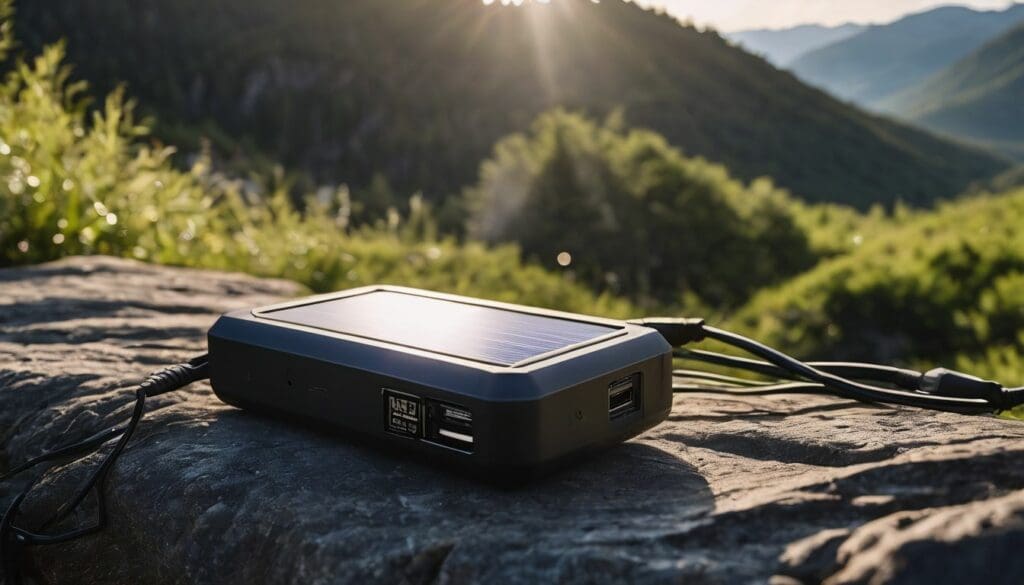In today’s world, staying connected is essential, but finding a power source can be a challenge. Portable solar chargers harness the sun’s energy to keep your devices powered up anywhere under the open sky.
This article will guide you through the perks of using solar chargers and how they contribute to both your convenience and the planet’s health. Discover why going solar is a bright idea!
Key Takeaways
- Portable solar chargers use clean, renewable energy to power devices, reducing reliance on fossil fuels and helping lower carbon emissions.
- They are practical for outdoor activities such as camping and hiking because they are lightweight, convenient and do not require access to electricity.
- Solar chargers can save money over time by eliminating the need to purchase disposable batteries or pay for grid electricity when charging mobile devices outdoors or during travel.
- The effectiveness of portable solar chargers depends on sunlight exposure; cloudy or rainy conditions can limit their charging capacity and efficiency.
- When choosing a solar charger, important factors include the device’s size, weight, capacity for battery storage, materials used in construction, cost considerations and ensuring compatibility with the intended electronic gadgets.
What is a Portable Solar Charger?
A portable solar charger is a solar-powered battery charger that uses sunlight to generate electricity for recharging devices. It works by converting solar energy into electrical power, making it an eco-friendly and convenient way to stay powered up on the go.
Principles of solar charging
Solar charging harnesses sunlight to generate electricity through solar panels. These panels contain photovoltaic cells that convert light energy into electrical energy, which is then stored in a battery within the charger.
The process begins when photons from the sun knock electrons free from atoms within the cells, creating a flow of electricity.
Portable solar chargers use this clean energy source to power various devices, making them an ideal choice for sustainable living. They are especially useful for outdoor activities where traditional power sources are not available.
Convenient and easy to use, these chargers provide renewable energy on-the-go, reducing reliance on fossil fuels and contributing to environmental conservation.
How it works
Portable solar chargers work by harnessing the power of sunlight and converting it into electricity, which is then stored in a built-in battery. When exposed to sunlight, the solar panels on the charger absorb photons, releasing electrons that create an electric current.
This energy is then transferred to the battery for storage and later use. The stored power can be accessed through various USB ports, allowing you to charge your mobile devices such as phones or tablets anytime, anywhere.
The process of solar charging involves no moving parts and operates silently, making it a reliable option for environmentally conscious individuals looking for sustainable energy solutions.
Advantages of Portable Solar Chargers
Portable solar chargers are environmentally sustainable, lightweight and convenient, and cost-effective. They also provide reliable backup power for off-grid charging and are compatible with a variety of mobile devices.
Environmental sustainability
Portable solar chargers contribute to environmental sustainability by harnessing the power of the sun, a clean and renewable energy source. This reduces dependence on traditional electricity, lowering carbon emissions and minimising environmental impact.
Embracing portable solar charging technology aligns with eco-friendly values and supports the conservation of natural resources for a greener planet.
By using portable solar chargers, you can actively take part in reducing your carbon footprint while enjoying reliable power on-the-go. Harnessing the sun’s energy decreases reliance on non-renewable resources, like fossil fuels or traditional electricity sources.
Lightweight and convenient
Portable solar chargers are designed to be lightweight and convenient, making them easy to carry and use on the go. They are ideal for outdoor activities such as camping, hiking, and travelling.
These chargers can easily fit into a backpack or bag, allowing you to harness solar power wherever you are. With their compact design, they provide a hassle-free way to keep your devices powered without the need for traditional electrical outlets.
Solar-powered battery chargers offer a portable solution that aligns with the environmentally conscious choices many individuals strive for. The convenience of being able to charge your devices using renewable energy sources while on the move is unparalleled.
Low cost
When considering the benefits of portable solar chargers, the aspect of low cost cannot be overlooked. Portable solar chargers offer an affordable option for environmentally conscious individuals seeking to reduce energy expenses and support conservation efforts.
These cost-effective devices provide an opportunity for sustainable energy solutions without incurring hefty electricity bills.
In comparison to traditional power sources, portable solar chargers eliminate the need for purchasing disposable batteries or expensive charging devices, offering a budget-friendly alternative that aligns with environmental values.
Compatibility with mobile devices
Portable Solar Chargers are compatible with a wide range of mobile devices, including smartphones, tablets, and other USB-powered gadgets. This allows users to charge their essential devices while on the go, making them ideal for outdoor activities such as hiking, camping, or travelling.
The convenience of being able to harness solar power to keep mobile devices charged promotes energy efficiency and reduces reliance on traditional grid electricity. Additionally, the lightweight nature of these chargers makes them easily transportable for those who prioritise sustainability and off-grid living.
Reliable backup power
Transitioning from the compatibility of portable solar chargers with mobile devices, it is essential to highlight their reliability as backup power sources. In outdoor or emergency situations, these chargers can serve as a dependable and renewable energy solution.
Whether you’re hiking in the wilderness or encountering a power outage, having a portable solar charger ensures that you can keep your essential devices powered up for communication and safety.
This capability aligns with the ethos of environmental sustainability while providing practical benefits in real-world scenarios.
The dependability of portable solar chargers as backup power makes them an invaluable resource for individuals committed to sustainable living and off-grid adventures. By harnessing sunlight to generate electricity, these chargers offer a reliable source of energy wherever you go.
Off-grid charging
Off-grid charging allows you to harness the power of the sun in remote locations where traditional electricity sources are unavailable. It provides a sustainable and reliable way to keep your devices powered while exploring nature or travelling off the beaten path.
Instead of relying on grid electricity, portable solar chargers enable you to charge your devices directly from sunlight, making them an ideal choice for environmentally conscious individuals seeking dependable power solutions during outdoor adventures.
Choosing the Right Portable Solar Charger
When selecting a portable solar charger, it’s important to consider factors such as size and weight, charging capacity, materials and manufacturer reputation, and setting a budget.
These considerations will help you find the best option for your needs.
Consider size and weight
When choosing a portable solar charger, consider the size and weight. The smaller and lighter the charger, the more convenient it will be for outdoor activities or travel. Look for compact designs that are easy to carry and store without adding extra bulk to your gear.
Additionally, lightweight chargers are ideal for backpacking or hiking adventures where every ounce matters.
Be sure to check the dimensions and weight of the charger before making a purchase decision. Look for options that offer a balance between portability and charging capacity to meet your specific needs while on the go.
Determine capacity and device type
When selecting a portable solar charger, it is crucial to determine the capacity and device type that best suits your needs. Assess the battery size and power output of the charger to ensure compatibility with your devices.
Consider if you need a solar charger for smartphones, tablets, or other electronic gadgets, as different devices require varying charging capacities. Additionally, evaluate the physical size and weight of the solar charger to match your portability preferences.
Researching various portable solar chargers can help in determining the most suitable option for your specific requirements. Take into account factors such as battery storage capacity, charging speed, and overall durability.
Research materials and manufacturer
When selecting a portable solar charger, it is essential to research the materials used and the manufacturer’s reputation. Look for chargers made with high-quality, durable materials that are designed for outdoor use.
Ensure that the manufacturer has a track record of producing reliable and efficient solar charging devices. By researching both the materials and the manufacturer, you can make an informed decision and choose a portable solar charger that meets your sustainability goals and power needs while minimising environmental impact.
By carefully considering the materials used in construction and researching reputable manufacturers, environmentally conscious individuals can select a portable solar charger that aligns with their values of conservation and sustainability.
Set a budget
When setting a budget for a portable solar charger, consider the amount you are willing to invest in this sustainable energy solution. Research the market and compare prices to find a product that aligns with your financial plan.
Narrow down options based on price, ensuring that you balance cost with quality and desired features.
Evaluate the long-term savings potential of investing in a portable solar charger against traditional charging methods. Factor in the environmental benefits and potential reduction in electricity bills over time.
Limitations of Portable Solar Chargers
Portable solar chargers are dependent on sunlight, which means they may not be as effective in cloudy or rainy weather. Additionally, their charging capacity is limited compared to traditional power sources.
Dependence on sunlight
Portable solar chargers are a convenient and sustainable source of power; however, their effectiveness is reliant on exposure to sunlight. Weather conditions and varying sunlight intensity can affect the charging capacity of these devices, making them less efficient during cloudy or rainy days.
As such, it’s important for users to consider the location and climate where they plan to use their portable solar charger.
Moving on from the limitations of portable solar chargers, let’s delve into ways to maximise their charging potential based on your requirements and usage patterns. Evaluating the best options will ensure that you select a suitable device that meets your needs effectively.
Limited charging capacity
Portable solar chargers have a limited charging capacity, which means they may not be able to fully charge larger devices like laptops. They are more suitable for smaller devices such as smartphones, tablets, and other small electronics due to their restricted power output.
This limitation can affect the practicality of using portable solar chargers for certain purposes or in situations where high power demand is required. However, it’s important to assess your specific charging needs before selecting a portable solar charger.
It’s crucial to consider the energy requirements of your devices and how long you’ll be off-grid or away from traditional power sources.
Can be affected by weather conditions
Limited charging capacity may not be the only concern with portable solar chargers. Weather conditions also play a significant role in their effectiveness. Cloudy or rainy days can reduce the amount of sunlight available for charging, impacting the speed and efficiency of recharging devices.
It’s important to consider this limitation when relying on solar power as a primary or sole source of energy, especially during extended periods of inclement weather.
It is essential to have contingency plans in place for cloudy or rainy days when using portable solar chargers. This could include having alternative power sources available or adjusting usage patterns to conserve energy during periods of limited sunlight availability.
Conclusion
In conclusion, portable solar chargers offer a sustainable and convenient way to power your devices on the go. The lightweight design makes them easy to carry, while their compatibility with various mobile devices provides reliable backup power wherever you are.
With the potential for off-grid charging, portable solar chargers truly empower environmentally conscious individuals to stay connected without relying solely on traditional energy sources.
FAQs
1. What are portable solar chargers?
Portable solar chargers are devices that use solar panel technology to harvest energy from the sun, providing power for charging gadgets like phones and power banks.
2. How does a solar-powered battery charger benefit me while I’m outdoors?
A solar-powered battery charger lets you charge your devices off-grid, making it perfect for outdoor adventures where traditional power sources are unavailable.
3. Can I really rely on a solar phone charger to keep my phone powered?
Yes, a quality solar phone charger can reliably power your device with sunlight as the source, offering you freedom and convenience even when away from home.
4. Are portable solar chargers heavy to carry around?
Not at all! Portable means they’re designed for easy carrying; most of these chargers are lightweight and ideal for anyone needing power on the move without extra weight.
5. Will a portable solar power bank work if it’s not sunny outside?
Solar chargers work best under direct sunlight but can still gather energy on overcast days; however, efficiency may be reduced so additional charging time might be necessary.





